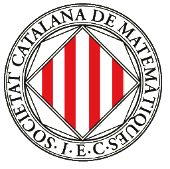Yago Antolín (Vanderbilt University, USA),
Title: Conjugacy and hyperbolicity.
Abstract: I’ll explain why the conjugacy growth series of a non-elementary hyperbolic group is transcendental and use this result to prove that in a finitely generated acylindrically hyperbolic group no language containing exactly one minimal length representative of each conjugacy class is regular. If time permits, I will discuss some results about conjugacy length functions. This will be based in joint works with Laura Ciobanu and Adrew Sale.
Collin Bleak (University of St Andrews)
Title: On the semi-decidability of the periodicity problem for elements of various groups.
Abstract: We prove that both the Higman-Thompson group 2V and the rational group R_n of Grigorchuk, Nekrashevych, and Suschanskii have semi-decidable periodicity problems. That is, there are algorithms which can confirm, given an element of one of these groups, that the element has finite order. However, there is no algorithm which can confirm in finite time whether a general element of one of these groups has infinite order. The argument is based on studying the achievable dynamical systems under the action of 2V on a Cantor space. Joint with Jim Belk.
Josep Burillo (Universitat Politecnica de Catalunya)
Title: Metric estimates for finitely generated groups.
Abstract: We will review the concept of metric estimate for a finitely generated group. The word metric for an element is usually quite difficult to find, and many times it is possible to replace it by an estimate which differs only in a multiplicative constant but which is much easier to compute. We will show some results finding estimates for groups, such as Baumslag-Solitar groups or wreath products.
Ilya Kazachkov (Euskal Erriko Unibersitatea)
Title: On limit groups over partially commutative groups.
Abstract: The class of limit groups can be likened to the classical coordinate algebras in algebraic geometry. Limit groups admit extremely rich and diverse characterizations and this versatile nature makes them a fine example of the connection between Group Theory, Algebra, Geometry, and Model Theory. Its importance from each of the different perspectives has led to an intensive study of these groups in recent years.
The class of partially commutative groups is a prominent class of groups which is widely studied in different branches of mathematics and computer science. Most recently, partially commutative groups became key to solving some well-known problems in group theory and topology, like Baumslag’s conjecture on residual finiteness of one-relator groups with torsion and the virtually fibred conjecture for 3-manifolds.
In this talk, I will describe a universe for the class of limit groups over partially commutative groups. I will then explain how this result can be used to study algorithmic problems. This is joint work in progress with A. Duncan and M. Casals-Ruiz
Adam Piggott (Bucknell University, USA)
Title: The Symmetries of McCullough-Miller Space.
Abstract:We prove that if W is the free product of at least four groups of order 2, then the automorphism group of the McCullough-Miller space corresponding to W is isomorphic to group of outer automorphisms of W. McCullough-Miller is therefore, in some sense, a best possible topological model for Out(W). We also prove that, for each integer n such that n > 2, the automorphism group of the hypertree complex of rank n is isomorphic to the symmetric group of rank n.
Anne Thomas (University of Glasgow)
Title: Palindromic automorphisms of right-angled Artin groups.
Abstract: We introduce the palindromic automorphism group and palindromic Torelli group of a right-angled Artin group, generalising from the case of a free group. We find generating sets for these groups and consider their relationship with the centraliser of the hyperelliptic involution. This is joint work with Neil Fullarton.

